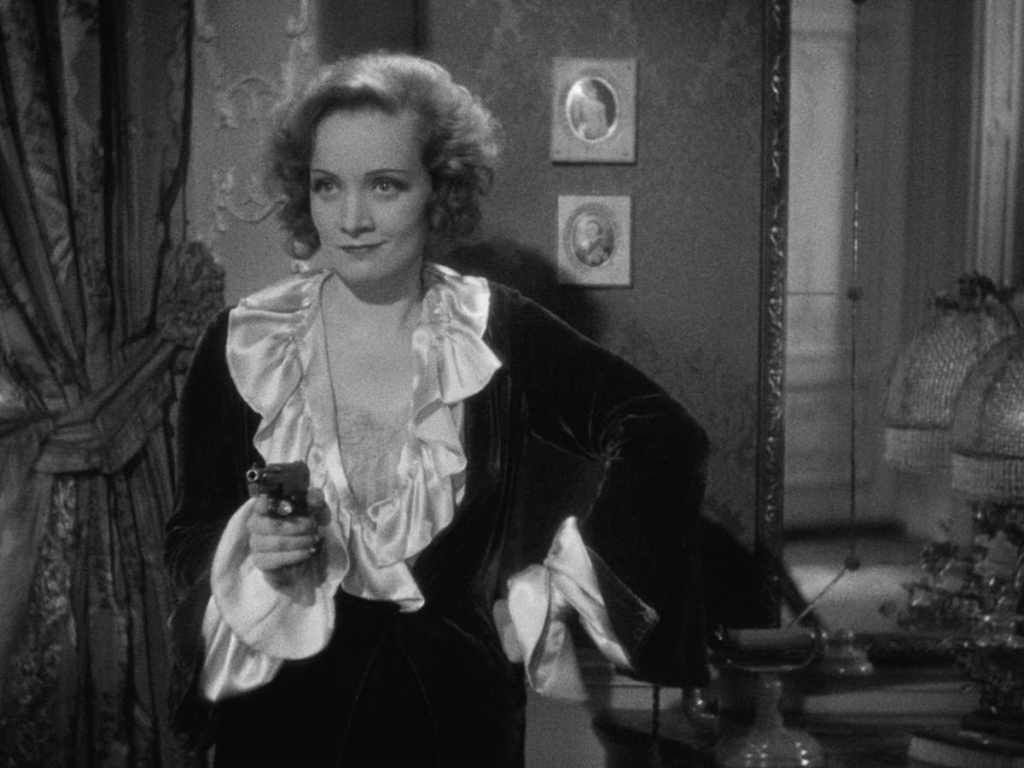“I think of death as a beautiful young woman wearing flowers.”
“The dimensions of the typified world represented by the image dissolve around the feminine effigy, who is given as a model of the ephemeral, the elusive, the universally illusory.”
— Claude Ollier, “Josef von Sternberg” in Cinema: A Critical Dictionary
The opening shot of director Josef von Sternberg’s Dishonored? Marlene Dietrich’s legs, pulling up a loose stocking. The closing shot? Marlene Dietrich’s legs, pulling up a loose stocking. Like poetry, they rhyme.


The third film of the Dietrich/von Sternberg cycle (the second made in Hollywood), Dishonored was rushed into production after the success of Morocco, which was actually released in the States before their first collaboration, the Weimar Republic masterpiece, The Blue Angel. In Dishonored, Everything feels just a little bit bigger: the sets, the costumes, Victor McLaglen’s teeth. If you thought Morocco only hinted at Dietrich’s character as a working girl, here it’s spelled out in bright, red, (B&W) scarlet letters (or more literally: in her furs, veils and bare legs; audiences understood the symbols). Her service to the war effort is servicing her countrymen, and she’s not ashamed of it.
All that said, I definitely did not have Dietrich impersonating a buxom, dim-witted chambermaid who meows like a cat on my Cinema Bingo card. But it’s exactly that unique joie de vivre that lands Marie (Dietrich) in the palm of the Austrian Secret Service in the first place. “I’m not afraid of life,” she says. “I can exploit that,” Chief Gustav von Seyffertitz thinks.




At first, I didn’t understand Marie aka X-27’s motivations for saving Russian spy Colonel Kranau (McLaglen) until I realized it wasn’t so much because she loved him or even thought he was a good person, she was just sick of all the unnecessary death and bloodshed. This is the only reason that makes sense to me, because why else would she sacrifice her life for someone who planned to kill her, and who, in his last words makes clear, is a man that puts country over romantic love? I have to believe that maybe, she respected that, she shared those values, more than she actually loved him.
What I’m trying to say is, don’t go into this film expecting a romance with a male lead of Gary Cooper or Cary Grant caliber. This is The Dietrich Show. McLaglen’s Russian agent is a foil, but no lover-man (he’s “no one’s idea of a matinee idol,” writes critic and biographer Gary Giddins). There’s no intimacy beyond a transactional, time-wasting tryst. If it’s a love story at all, it’s one between von Sternberg and his native Vienna, recreated as dreamscape with “crepe and spit,” Giddins observes.




Throughout, von Sternberg is clearly making a point about spycraft being a more “ignoble profession” than prostitution. He caricatures the Men Playing War with their invisible ink, trap doors and gigantic wall maps. Instead of these war games being worthy of respect, his message? There is a more “noble transcendence of glamour” in Marie’s stoic, streetwalker death.
It still feels wild that the ending got past the early Hays Code. I’m sure in their small-brains they saw it as Marie being punished for her past transgressions, so it got rubber stamped. But it’s actually a middle finger to all the butchers and war-mongers. When she applies lipstick before the firing guard she’s laughing in the face of death, and those arrogant enough to think that they alone have control over life.
“It may become my good fortune to have a glorious death.”
Dishonored can be purchased through criterion in the US or through indicator in the eu